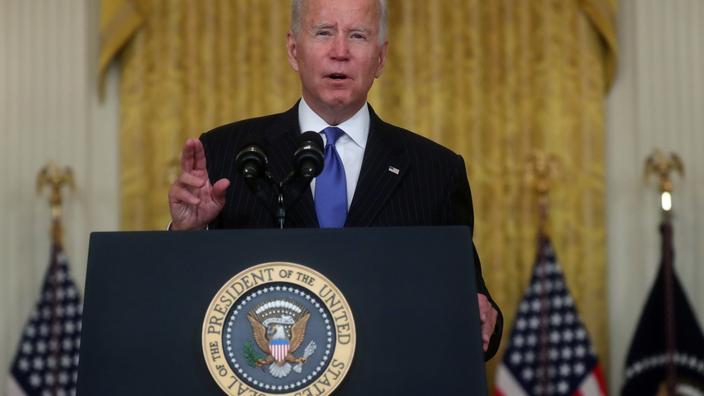Joe Biden’s United States on Wednesday threatened to use the military option against Iran if diplomacy fails to prevent Tehran from acquiring atomic weapons, making it the first both clearly echo Israeli warnings. On the eve of a crucial visit by the European Union negotiator on Thursday to Tehran, impatience is mounting on the American side, but also on the European side, and the change of tone is evident.
Read alsoNuclear: bloodless, Iran increases pressure on the United States
Washington pense “That a diplomatic solution is the best way” to prevent the Islamic Republic from becoming a nuclear power, said US foreign minister Antony Blinken at a press conference with his Israeli counterpart Yair Lapid in the US capital. But he judged little “Encouraging” the signals emanating from Tehran, which has still not set a date for the resumption of negotiations aimed at saving the 2015 international agreement on Iranian nuclear power, which has stopped since June. “It takes two to dialogue and we have not seen, at this stage, the will to do the same on the part of Iran”, lamented the Secretary of State, once again considering that the “launch window” was closing with great strides.
“We are ready to turn to other options if Iran does not change direction”, he warned when he was questioned about the possibility of the use of force. “We will consider all options.” At his side, the Israeli minister has driven the point home, without being contradicted. “By saying ‘other options’, I think everyone understands”, he launched, in a clear allusion to the military option. Yaïr Lapid has also been even more explicit on behalf of the Hebrew state, long opposed to the 2015 agreement which it considers insufficient.
“Secretary of State Blinken and I are children of Holocaust survivors. We know there are times when nations must use force to protect the world from evil ”, did he declare. “Israel reserves the right to act at any time, and whatever the means”, he hammered. Former US President Donald Trump slammed the door in 2018 on this agreement between Iran and the great powers, and reinstated the US sanctions it had allowed to be lifted. In return, Tehran has increasingly freed itself from restrictions supposed to prevent its nuclear program from culminating in the manufacture of the bomb.
“Protect the world”
President Biden has said he is ready to return to the agreement on condition that Iran simultaneously renews its commitments. Indirect negotiations between Washington and Tehran, through the intermediary of the other signatories, started in April in Vienna to save this agreement, but have been suspended since the election in June of a new Iranian president. European negotiator Enrique Mora, coordinator of the 2015 text, is expected in Tehran on Thursday. “I will insist on the urgency of resuming negotiations”, he tweeted on Wednesday. Same frustration on the French side, where we regret the absence of “clarity” Iranian one “Refusal to negotiate” and the “Facts accomplished on the ground which further complicate the return” to the agreement.
In this context where pessimism seems to prevail, Yair Lapid had come to Washington to demand from the Biden government a “Alternative plan B”. And the Americans, long reluctant to talk about anything other than a return to the agreement, have changed their strategy by openly raising the hypothesis of failure themselves. “We are realists. We know that there is at least a strong possibility that Iran will choose another path ” that a restoration of the agreement, also declared Wednesday the American envoy for Iran, Rob Malley. The American negotiator announced that he would visit Saudi Arabia, the United Arab Emirates and Qatar in the coming days to discuss in particular the «options» for “Control the Iranian nuclear program” if the negotiations are unsuccessful.
Read alsoIranian nuclear power plant: the window is closing
Antony Blinken and Yaïr Lapid also held a three-way meeting on Wednesday with their Emirati counterpart, Sheikh Abdullah bin Zayed Al Nahyane, to try to revive the dynamics of the process of recognition of Israel by the Arab countries. “We are determined to continue to build on the efforts of the previous government to broaden, over the next few years, the circle of countries with normalized relations with Israel,” said the US Secretary of State. These “Abraham’s agreements” for the recognition of Israel were signed in September 2020 by the Emirates and Bahrain, under the aegis of Donald Trump, who made it one of his main diplomatic successes. Morocco followed this example, as did Sudan.
– .


